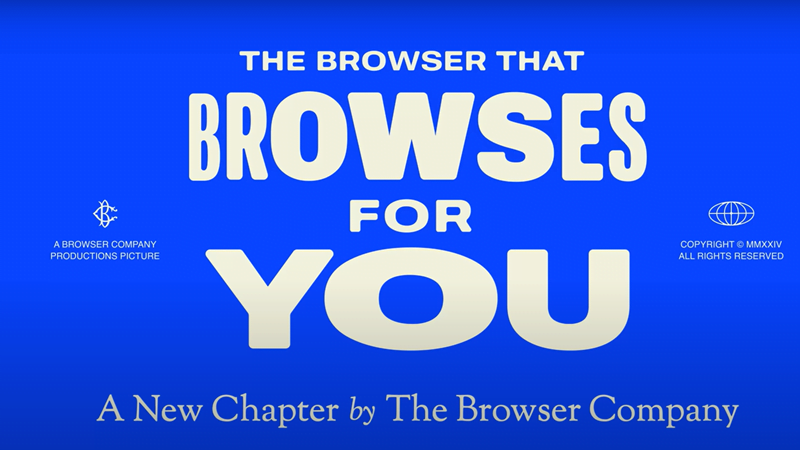
Safari and Google Chrome? That was yesterday! Innovative web users rely on the Arc browser these days! What exactly is so special about it and is the hype surrounding Arc really justified?
The tech community has a new favorite product: the Arc Browser! Statements like “I will never use another browser again” or “I haven't had this much fun surfing in a long time” have dominated tech magazines and Internet forums for months.
What exactly is Arc and why is everyone so excited about it? We answer the most important questions about the new trend browser from the USA.
What is Arc Browser?
Calling Arc a browser might be a bit misleading. Because while Arc searches the web for you and answers search queries, the user experience is completely different than on common browsers such as Chrome or Safari.
In fact, Arc is designed more like a home screen. So instead of using different tabs, windows or bookmarks, with Arc everything on the home screen happens on a single screen.
With Arc everything happens in one window. (Source: Arc.net)
What's special about Arc?
It's exactly this homescreen experience that makes Arc so special. There are no tabs. Instead, requests can be organized using widgets or if you want to edit something in parallel, you no longer have to switch between tabs, but can simply split the browser window into two.
Search results do not need to be clicked. Users can simply hover over a search result and then read the article or watch a video in a pop-up directly on the results page.
AI features such as ChatGPT are also integrated and help with searches.
There are also countless ways to customize your browsing experience. If you want, you can spend about an hour setting your color scheme for Arc. Is that necessary? No! But it's a lot of fun and it has the Ikea effect: If you can adapt something to your needs, you'll use a product more often and with greater pleasure.
Are there any criticisms of Arc?
Arc offers a very high-quality browsing experience with innovative AI features. But all of these options can be a bit overwhelming. There is also the risk that with this large range of features, many functions will simply be overlooked.
Precisely because the experience is so different from classic browsing, a gradual introduction of features for new users or more tutorials would be helpful.
How can I use Arc?
So far, the use of Arc is limited. On the one hand, users can only get access to Arc via an invitation link. And on the other hand, Arc is currently only available for iOS devices. A Windows version is in beta and is expected to be launched in the coming months. Those interested can be placed on a waiting list.
An Android version is also planned, but when it will come is not known.
This exclusivity is certainly also a factor that contributes to the hype surrounding the Arc browser.
Who developed the Arc browser?
“The Browser Company” from New York is behind the development of Arc. According to information on the company's LinkedIn profile, The Browser Company has between 11 and 50 employees and is “a group of friendly people working to make the Internet feel more like home.”
The co-founder and CEO of the start-up is Josh Miller. Miller previously worked as digital product director in the White House for US President Barack Obama. Miller sold his very first startup, Branch, to Facebook in 2014 for $15 million.
The team behind Arc consists of top people who have previously worked for companies like Tesla, Instagram, Amazon or Chrome.
What is the business model behind Arc?
That is actually the question of all questions. Because so far Arc is completely free. According to its own information, the browser does not collect any user data and Arc is 100 percent ad-free. So how does Browser Company make money from Arc?
That is still unclear. Miller has suggested various possibilities, but there are no concrete approaches. Of course, different variants are conceivable.
Arc's user base is niche, but financially strong, with developers, tech workers and designers, and it's exactly the right target group that can advance a product in the tech world.
Theoretically, there are several business models for Arc, such as product placement in the browser, subscription models or even affiliate marketing.
Can Arc really replace Google Chrome and Safari?
This is currently difficult to imagine. Google Chrome dominates the German browser market with almost 33 percent market share. Globally, 66 percent of Internet users use Chrome, with Safari coming in second at 18 percent.
As innovative as Arc may be, getting started is a bit complex. This could be a hurdle, especially for users without special technology knowledge. Humans are also creatures of habit. And if Safari and Chrome have worked well for years, why switch?
On the other hand, it is also conceivable that Arc will have an iPhone moment and, as an application, will convince so many users that they will switch. Especially if Arc significantly improves the search experience, it's possible that Arc can at least become one of the top browsers.
Also interesting:
Source: https://www.basicthinking.de/blog/2024/02/25/arc-browser/


